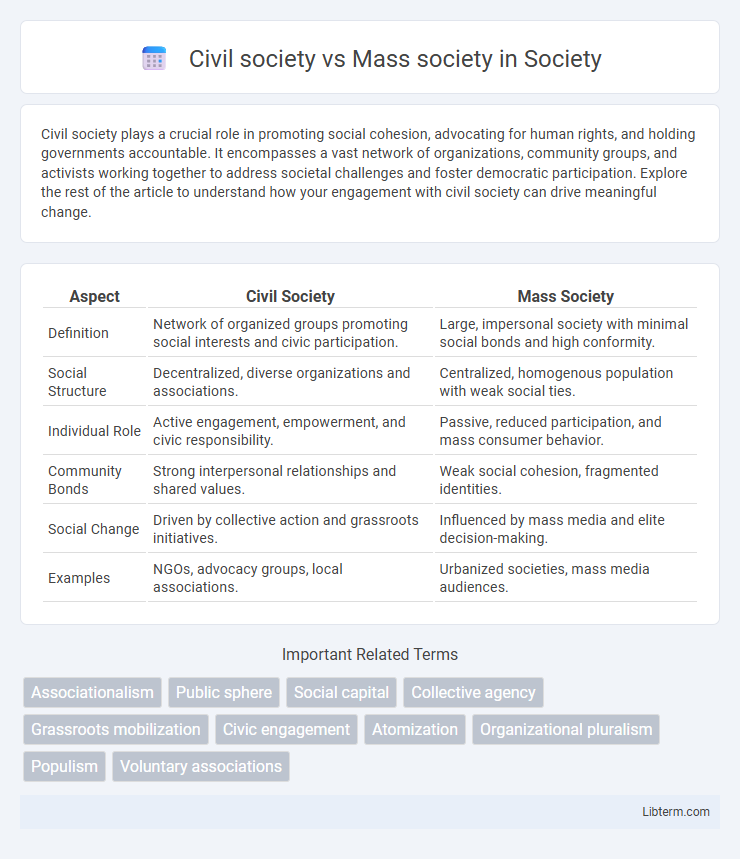Civil society plays a crucial role in promoting social cohesion, advocating for human rights, and holding governments accountable. It encompasses a vast network of organizations, community groups, and activists working together to address societal challenges and foster democratic participation. Explore the rest of the article to understand how your engagement with civil society can drive meaningful change.
Table of Comparison
| Aspect | Civil Society | Mass Society |
|---|---|---|
| Definition | Network of organized groups promoting social interests and civic participation. | Large, impersonal society with minimal social bonds and high conformity. |
| Social Structure | Decentralized, diverse organizations and associations. | Centralized, homogenous population with weak social ties. |
| Individual Role | Active engagement, empowerment, and civic responsibility. | Passive, reduced participation, and mass consumer behavior. |
| Community Bonds | Strong interpersonal relationships and shared values. | Weak social cohesion, fragmented identities. |
| Social Change | Driven by collective action and grassroots initiatives. | Influenced by mass media and elite decision-making. |
| Examples | NGOs, advocacy groups, local associations. | Urbanized societies, mass media audiences. |
Defining Civil Society and Mass Society
Civil society encompasses voluntary organizations, institutions, and networks that operate independently from the government and market, facilitating citizen participation and collective action to promote social welfare and democratic values. Mass society refers to a social structure characterized by large, impersonal, and homogeneous populations where individuals experience weak social ties and limited participation in community or political life. The distinction lies in civil society's emphasis on active engagement and pluralism versus mass society's tendency toward social isolation and centralized control.
Historical Development of Both Concepts
Civil society emerged during the Enlightenment as a sphere of voluntary associations distinct from the state and economy, emphasizing individual rights, civic participation, and social trust. Mass society theory developed in the late 19th and early 20th centuries, influenced by industrialization and urbanization, highlighting concerns over social fragmentation, alienation, and the decline of traditional community bonds. Historical debates contrast the growth of organized, participatory civil society institutions with the rise of impersonal mass society characterized by mass media influence and centralized political power.
Key Characteristics and Differences
Civil society is characterized by voluntary associations, social networks, and shared norms that enable citizen participation and collective action, whereas mass society features large, impersonal populations with weakened social ties and limited individual influence. Civil society emphasizes decentralized power and autonomy from the state, contrasting with mass society's centralized control and homogenized cultural experiences. The key differences lie in social cohesion, individual agency, and the role of intermediary institutions mediating between individuals and political authority.
Role in Modern Democracies
Civil society acts as a critical platform for citizen engagement, fostering democratic participation, accountability, and pluralism by enabling diverse interest groups to influence public policy and social norms. Mass society, characterized by large, impersonal social structures, often leads to political disengagement and vulnerability to manipulation, potentially undermining democratic processes through homogenization and reduced individual agency. In modern democracies, a vibrant civil society strengthens democratic resilience by promoting dialogue and collective action, contrasting with the alienation frequently associated with mass society dynamics.
Social Structure and Community Engagement
Civil society consists of organized groups and networks that foster active community engagement and participation, reinforcing social bonds and collective action within a structured social framework. In contrast, mass society is characterized by large, impersonal social structures where individuals experience social isolation and limited community involvement, weakening social cohesion. The distinction highlights how civil society promotes interconnectedness and social capital, while mass society tends toward fragmentation and anonymity in social relations.
Influence on Political Participation
Civil society fosters political participation through organized groups, advocacy, and civic engagement, enabling individuals to collectively influence policymaking and government accountability. Mass society, characterized by large, impersonal social structures, tends to diminish direct political involvement due to weaker social ties and reduced collective action. The strength of civil society networks directly correlates with higher voter turnout and active participation in democratic processes, contrasting with the passive engagement often seen in mass societies.
Impacts on Individual Identity and Autonomy
Civil society fosters individual identity and autonomy by encouraging active participation in voluntary associations that promote personal expression and social responsibility. In contrast, mass society tends to dilute individuality through homogenized cultural consumption and centralized power structures, leading to reduced personal agency. The divergence impacts social cohesion, as civil society supports diverse identities while mass society often prioritizes conformity and control.
Challenges Facing Civil Society Today
Civil society faces significant challenges today, including shrinking civic spaces due to authoritarian governance and restrictive legal frameworks that limit freedom of association and expression. The rise of misinformation and digital surveillance hampers trust and effective mobilization within civil society organizations. Economic inequalities and reduced funding sources further weaken civil society's capacity to advocate for social justice and democratic governance.
Consequences of Mass Society Domination
Mass society domination leads to weakened individual autonomy as centralized power structures suppress grassroots participation and critical thinking, fostering conformity and social isolation. The erosion of intermediary institutions like families, local communities, and civic organizations diminishes social capital and mutual trust, resulting in political apathy and increased vulnerability to authoritarianism. Economic and cultural homogenization under mass society conditions also stifles diversity, innovation, and democratic engagement.
Future Prospects and Policy Implications
Civil society enhances democratic governance by fostering citizen participation and accountability, while mass society often dilutes individual influence through homogenization and centralized control. Future prospects suggest that strengthening civil society institutions can counterbalance mass society tendencies, promoting inclusive policies and social resilience. Policy implications emphasize investing in grassroots organizations, improving civic education, and ensuring transparent communication channels to empower communities and enhance societal cohesion.
Civil society Infographic

 libterm.com
libterm.com